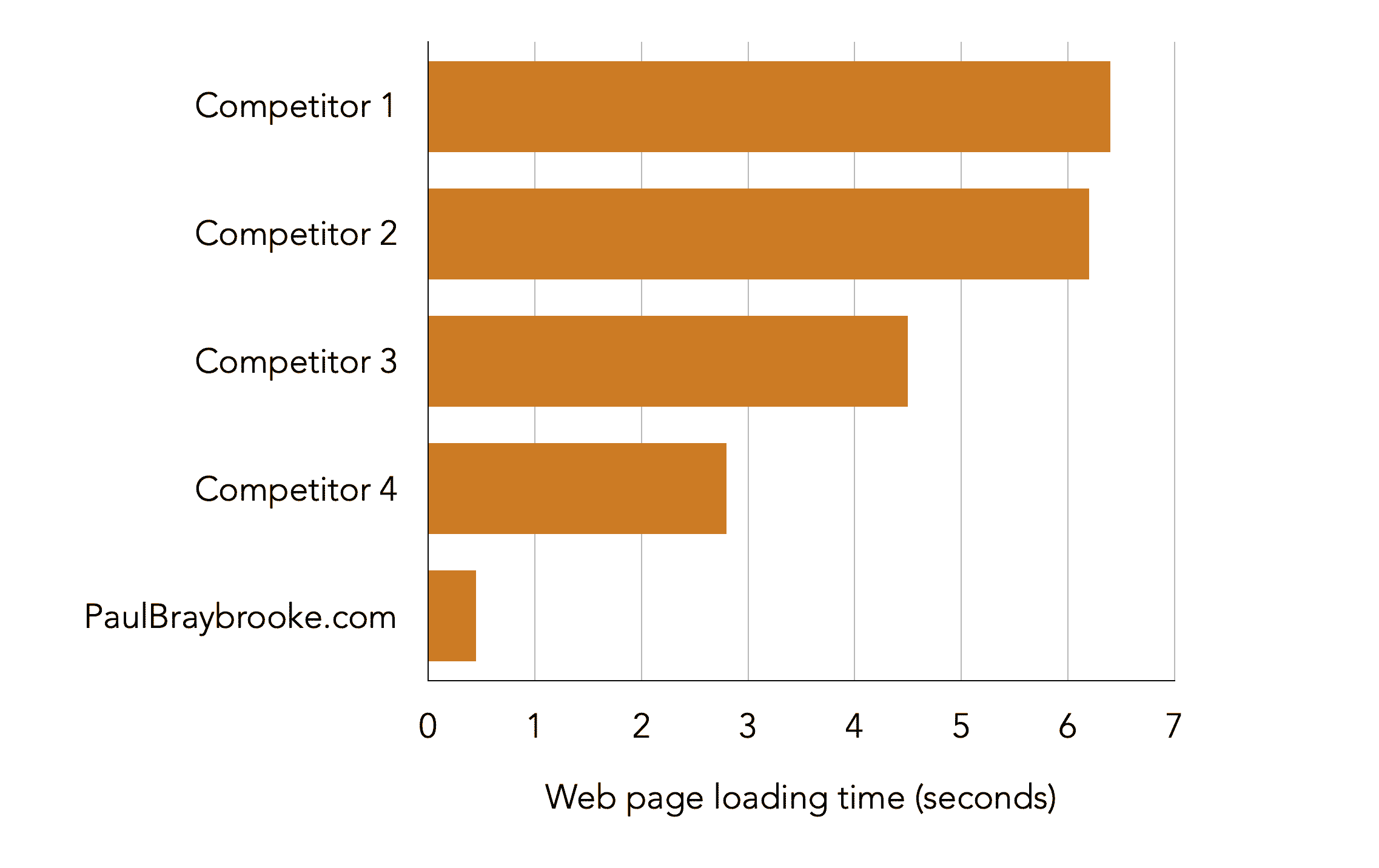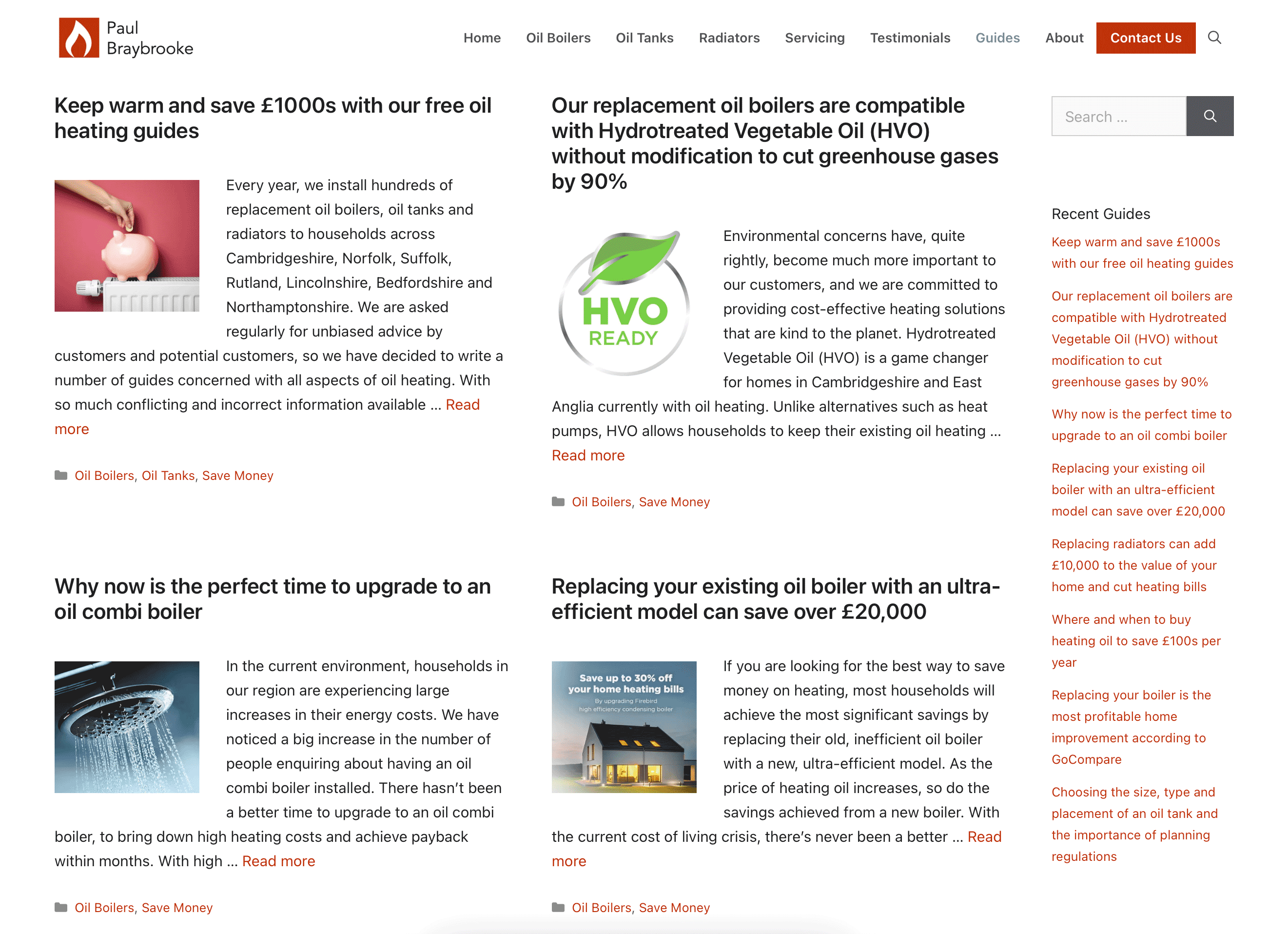
With 20 years of experience developing websites, I have long-term revenue-sharing partnerships with businesses in the heating and renewable energy sectors located in East Anglia. I provide ultra-fast websites, unique content and industry-leading Pay Per Click (PPC) advertising campaigns. Particular specialities are:
- development and hosting of ultra-fast WordPress websites that use the very latest web and server technologies, used by only 1.5% of websites, to deliver page loading times below half a second
- long-term development of unique website content, created from in-depth analysis and deep personal knowledge, to ensure high relevance to search queries (and top Google rankings)
- development and ongoing management of Google Ads campaigns, achieving industry-leading click-through (>20%) and conversion rates (>50%).
My advice and solutions are based on a successful track record of creating and running websites with millions of visitors and achieving substantial uplifts in turnover for small businesses.
Development of ultrafast Wordpress websites for businesses in East Anglia
Website speed is critical to attracting and converting online visitors. According to Pingdom, the average page speed from millions of speed tests it has conducted is 3.2 seconds, with small businesses generally having the slowest sites. Google recommends a page load time of 2 seconds or less. Research shows that a site that loads in 1 second or less has a conversion rate about three times higher than one that loads in 3 seconds or more. I specialise in achieving page loading times below half a second through a combination of the following:
- dedicated UK-based, cloud web hosting, with under-utilised HTTP/2 servers running PHP 8.2 and mariaDB 10.6, and achieving a Time-to-First-Byte (TTFB) under 25ms
- advanced browser caching and multi-level server caching (including Redis object caching and Varnish HTTP web acceleration)
- the best premium lightweight WordPress theme, optimised for speed and usability
- the best WordPress website builder, with a reputation for producing clean and lean code, with removal of all unnecessary code
- the absolute minimisation of WordPress plugins
- image optimisation and compression, using next-generation AVIF and WebP image formats
- the avoidance of external font libraries (for example, the now-ubiquitous Google Fonts)
- the minimisation of unnecessary code on web pages (such as CSS and Javascript)
- the elimination of so-called ‘render blocking’ resources (Javascript and CSS), which is critical to mobile performance.
Collectively, these techniques have a dramatic impact on page loading times, to improve the experience of website visitors and allow small businesses to ‘stand out from the crowd’. As shown below, independent measurements from GTmetrix show that the Paul Braybrooke website achieves page loading times of about one tenth of most of its competitors.

As well as affecting the experience of website visitors, website speed has now become a search engine ranking factor. Back in May 2020, Google announced that user experience would become an important ranking factor, quantified by a new set of metrics called ‘Core Web Vitals’. These measure loading speed, website responsiveness and visual stability. Over time, the competitive advantage of ultrafast websites has become more significant and I aim to stay ‘ahead of the game’.

As well as developing ultra-fast websites, I implement robust and secure email and contact form capabilities to ensure rapid and reliable communication with users, using Google Workspace and Rackspace enterprise email systems, all using SPF, DKIM and DMARC security.
Development of unique content and search engine optimisation – done legitimately
Over time, as Google’s algorithms have become smarter, Google’s ranking algorithms have been prioritising the quality, uniqueness and freshness of website content, and reducing the importance of backlinks. This development is long overdue, and great news for website visitors and website owners who want to do things properly. I have long-term partnerships with business owners to develop compelling website content to stand out from the crowd.
Too many small business owners pay companies a one-off fee for a small website, which immediately goes out-of-date and contains very little content. This approach generally has little impact on sales and profitability. In contrast, my approach is to develop unique and relevant content for search engine queries through in-depth knowledge, to substantially increase turnover and profitability.

Content is truly king. Websites and Google love information-rich sites that are packed with relevant, useful and timely content, and this is exactly my long-term focus. In general, small business owners are far too busy dealing with their customers to spend the time required to develop online content themselves so the relationship works really well for them. To view example content, visit:

To view example content, visit:
The term ‘search engine optimisation’ (or SEO) has almost become a dirty word because so many people associate the term with unethical (so-called ‘black hat’) techniques. The Internet is full of online companies offering paid backlinks, or utterly ineffective or severely damaging SEO ‘services’ for a given monthly subscription. Many SEO ‘information’ sites offer advice to website owners that is flawed and not actually based on any hard evidence whatsoever. It seems that the same old wrong information is replicated across the Internet, which actually makes it challenging for Google to communicate good advice.
The good news is that Google does provide a lot of information and support for website owners and developers and I try to keep on top of the very latest recommendations and good practice. Search engine optimisation is critically important, and it is essential that websites and their content are designed and implemented to make it easy for Google and other search engines to optimally feature these sites in their listings.
Development and management of Google Ads campaigns
Employing Pay Per Click advertising using Google Ads allows small businesses to avoid being held back by their Google organic rankings. Sadly, organic search results can be dominated by big-budget national firms or companies that have purchased dubious backlinks. Properly implemented, Google Ads can be extremely useful to small businesses since they can get them to the top of Google listings quickly for specific, highly relevant local searches. Also, no one will have escaped seeing changes over time to Google’s search engine listings, where paid ads have become more and more prominent. However, Google Ads present one of the biggest challenges to small and emerging businesses. It is extremely easy to spend many thousands of pounds and yet have very little to show for it.
I run Google Ads campaigns for a number of businesses in East Anglia on a revenue sharing basis. My Google Ads campaigns typically achieve:
- industry-leading Click Through Rates (CTR) above 20% with highly-competitive keywords
- conversion rates (enquiries to click ratio) above 50%.
My ads usually achieve a Google Quality Score of 10/10, which means that costs are considerably cheaper than the ads runs by competitors (which generally have much lower quality scores).
Below is a chart of Click Through Rates achieved with a recent Google Ads campaign across East Anglia.

Chart: Recent Click Through Rates Achieved with a Recent Major Google Ads Campaign
I have found the following critical to successful Google Ads campaigns:
- a very high quality score (typically 9/10 or 10/10). Google produces a quality score for its ads and those with higher quality scores pay less
- creation of compelling, well-written ads that are highly relevant to keywords and the intention of users
- extensive use of extensions (helping to dominate that top ad slot)
- extensive use of high-quality images
- creation of multiple ad versions, with substantial ongoing experimentation to constantly refine ads and pick the winners
- creation of individual, information-rich and ultra-relevant landing pages with very high conversion rates, for every major keyword targeted
- limiting ads to specific geographical areas (e.g. specific postcodes), times of the day, days of the week and particular devices, based on comprehensive analysis of data
- removal of ads that do not work superbly, so they do not dilute overall campaign results (to maximise your campaign score)
- bidding high enough to secure the top position in search listings (if that is beneficial)
- widespread use of negative keywords to minimise searches that are not highly relevant
- switching off the ‘Display Network’ (which often may not be effective)
- avoidance of targeting keywords that are too generic and avoidance of ‘broad match’ keywords
- analysis of competitor campaigns to identify opportunities
- understanding the financial model of Google Ads so that they are profitable
- regular meetings with Google experts to maximise the long-term performance of campaigns
- time and effort. Those looking for a quick fix will waste a lot of money or get few conversions!
Statistics underpin success with Google Ads. The development of ads over time is critical to success. Gaining statistical confidence with changes to eventually achieve very high conversion rates requires significant time, particularly with modest visitor numbers.
To get in touch, please contact us.
